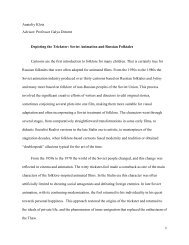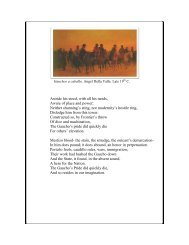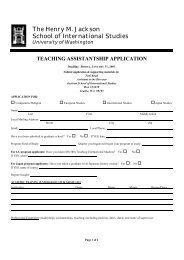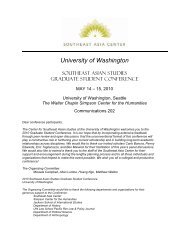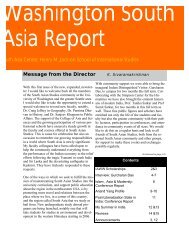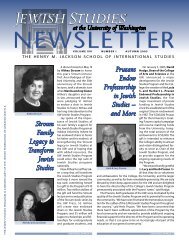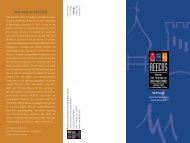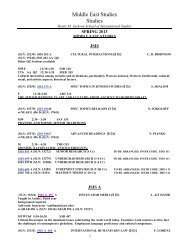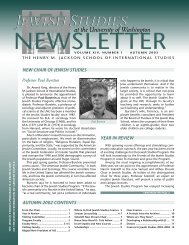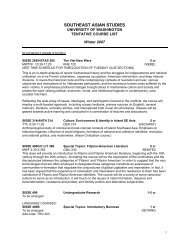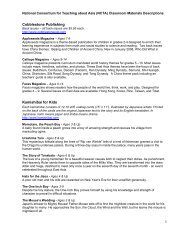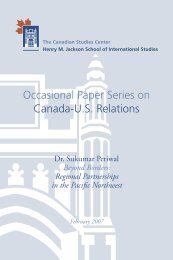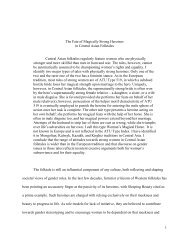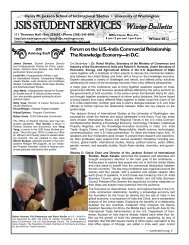anthropology comparative literature economics - Jackson School of ...
anthropology comparative literature economics - Jackson School of ...
anthropology comparative literature economics - Jackson School of ...
You also want an ePaper? Increase the reach of your titles
YUMPU automatically turns print PDFs into web optimized ePapers that Google loves.
RUSSIAN / EAST EUROPEAN / CENTRAL ASIAN STUDIES COURSES<br />
AUTUMN QUARTER 2011<br />
For descriptions not included in this list, go to: http://jsis.washington.edu/ellison/ or<br />
http://www.washington.edu/students/crscat/ or view instructor’s course description, linked to the course in the Time<br />
Schedule. Changes to schedule are posted at Autumn Time Schedule website:<br />
http://www.washington.edu/students/timeschd/Aut2011/<br />
ENTRY CODES FOR JSIS COURSES are available in Thomson 111. Students not attending class first week <strong>of</strong> the<br />
quarter may be dropped.<br />
GRADUATE STUDENTS NOTE: 200 and 300 LEVEL COURSES do not count towards graduation requirements<br />
unless they are approved by the chair <strong>of</strong> the REECAS program and the course instructor.<br />
ANTHROPOLOGY<br />
AREA STUDIES<br />
ANTH 569 Karl Marx's Grundrisse & Capital (5)<br />
This special studies seminar focuses on critical readings <strong>of</strong> Capital (Volume I) and the Grundrisse. Seminar<br />
participants will engage a variety <strong>of</strong> contemporary interlocutors including Toni Negri, Marx beyond Marx, Harry Cleaver,<br />
Reading Capital Politically, and Sylvia Federici, Caliban and the Witch. Participants will address the relevance and<br />
significance <strong>of</strong> Marx in the history and current practice frontiers <strong>of</strong> <strong>anthropology</strong> and the rise <strong>of</strong> various critical<br />
anthropologies.<br />
Pena, Devon A<br />
COMPARATIVE LITERATURE<br />
TTh 330-520 MGH 288<br />
C LIT 230 Introduction to Folklore Studies (5)<br />
Folklore (stories, songs, beliefs, customs, folk craft and folk art) is a window into a group's worldview. This course will<br />
survey the different genres <strong>of</strong> folklore and kinds <strong>of</strong> groups which maintain folklore traditions. A variety <strong>of</strong> theories and<br />
methods applied in folklore studies during the past two centuries will be introduced in readings and lectures.<br />
Comprehensive overview <strong>of</strong> the field <strong>of</strong> folkloristics, focusing on verbal genres, customs, belief, and material culture.<br />
Particular attention to the issues <strong>of</strong> community, identity, and ethnicity. Offered jointly with SCAND 230.<br />
Smidchens, Guntis<br />
MTWTh 1130-1220 SIG 134<br />
C LIT 496 Folktales Along the Silk Road (3)<br />
Contact instructor for course description. Offered jointly with C LIT 596B, NEAR E 496A, and SISRE 490<br />
Cirtautas, Ilse A<br />
MW 300-420 DEN 211<br />
C LIT 596 B Folktales Along the Silk Road (3)<br />
Contact instructor for course description. Offered jointly with C LIT 496, NEAR E 496A, and SISRE 490<br />
Cirtautas, Ilse A<br />
ECONOMICS<br />
MW 300-420 DEN 211<br />
ECON 435 Natural Resource Economics (5)<br />
Survey <strong>of</strong> the <strong>economics</strong> <strong>of</strong> renewable and nonrenewable resources including fisheries, forest, minerals, and fuels.<br />
Optimal trade-<strong>of</strong>fs between benefits and costs <strong>of</strong> resource use, including trade-<strong>of</strong>fs between current and future use.<br />
Effects <strong>of</strong> property rights on resource use. Prerequisite: ECON 300. Go to<br />
www.econ.washington.edu/instruction/courses/overloadpolicies.htm. for add code info.<br />
TBA,<br />
7/7/2011<br />
MW 830-1020 FSH 108<br />
Page 1 <strong>of</strong> 14
ECON 471 International Trade (5)<br />
This is an intermediate course in the theory <strong>of</strong> international trade. Using the tools <strong>of</strong> microeconomic analysis, we study<br />
the basis and pattern <strong>of</strong> trade as well as the welfare and distributional impacts <strong>of</strong> free trade among various groups in the<br />
economy. We also study the reasons for limiting trade and discuss some <strong>of</strong> the current trade policy issues. Systematic<br />
study <strong>of</strong> the material in this course helps students develop the mental skills necessary to gain insight into the workings<br />
<strong>of</strong> an open economy as well as the state <strong>of</strong> past and current international economic order. Prerequisite: 2.0 in ECON<br />
301. Go to www.econ.washington.edu/instruction/courses/overloadpolicies.htm. for add code info.<br />
Wong, Kar-Yiu A<br />
Salehi-Esfahani, Haideh B<br />
TTH 830-1020 MOR 225<br />
TTh 130-320 SAV 264<br />
ECON 472 International Macro<strong>economics</strong> (5)<br />
International monetary theory and open economy macro<strong>economics</strong>. Balance <strong>of</strong> payments and foreign exchange<br />
markets. Different exchange rate arrangements and their adjustment mechanisms. Money and international capital<br />
movements. Policy issues. The international monetary system. Prerequisite: 2.0 in ECON 301. Go to<br />
www.econ.washington.edu/instruction/courses/overloadpolicies.htm. for add code info.<br />
Turnovsky, Michelle<br />
MW 330-520 BNS 117<br />
ECON 495 Economic Transformation <strong>of</strong> Russia and Eastern Europe (5)<br />
Introduction What is a transitional economy? We use this term to characterize former socialist economies engaged in<br />
the process <strong>of</strong> establishing market institutions, but it may also distinguish any economy, which attempts to expand the<br />
roles <strong>of</strong> private ownership, investment, and entrepreneurship and to provide market-supporting governmental and legal<br />
institutions. Transitional economies are characterized by rapid and significant changes in institutional arrangements.<br />
Members <strong>of</strong> the society face changes in relative prices and in the structure <strong>of</strong> economic activity combined with high risk<br />
and uncertainty. The Twentieth Century was an era in which, briefly, almost half <strong>of</strong> the world’s population was governed<br />
by Marxist states. These states transferred the ownership <strong>of</strong> land, resources, and physical capital stocks to the<br />
government and established centralized administrative mechanisms for managing production.<br />
Thornton, Judith<br />
TTh 130-320 BAG 261<br />
ECON 535 Natural Resource Economics (3)<br />
Half <strong>of</strong> integrated two-course sequence in environmental and natural resource <strong>economics</strong>. Dynamic optimization.<br />
Nonrenewable resource extraction and exploration, including effects <strong>of</strong> market structure, uncertainty, and taxation.<br />
Renewable resources, including fisheries and forests. Prerequisite: ECON 500; ECON 501, or permission <strong>of</strong> instructor.<br />
ETHNOMUSICOLOGY<br />
TTh 1030-1150 Sav 167<br />
MUSIC 316 Music Cultures <strong>of</strong> the World (5)<br />
Near East, Central Asia, Far East, South and Southeast Asia, Indonesia, and the Philippines.<br />
Music 316 explores the relationship <strong>of</strong> music to peoples' ways <strong>of</strong> life in the various regions and cultures <strong>of</strong> Asia. People<br />
construct the world around them into diverse cultural patterns and systems; and music is always an important element<br />
in such constructions. Music may be many different things to different peoples and cultures --- ranging from something<br />
as abstract or ideal as an expressive "art" or a medium <strong>of</strong> religious worship, to something as practical as an item in the<br />
technological toolkit for hunting game, curing sickness, or storing and communicating information. Music frequently<br />
plays an important role in kinship, economic, political, and legal systems. And music, like the rest <strong>of</strong> culture, is always<br />
changing and developing new forms. We will hear some <strong>of</strong> the most unusual and beautiful <strong>of</strong> these forms as we<br />
consider the dynamics and significance <strong>of</strong> music in cultures ranging from small nomadic camps to immense<br />
civilizations, spread across the world's largest continent.<br />
Ellingson, Ter<br />
7/7/2011<br />
MTWF 1030-1120 MUS 213<br />
Page 2 <strong>of</strong> 14
GEOGRAPHY<br />
GEOG 433 Resource Use & Management in Russia & the NIS (5)<br />
This course is focused on the geographic and historical background <strong>of</strong> the natural resources <strong>of</strong> Russia and the Newly<br />
Independent States and the management and utilization <strong>of</strong> these resources. Geographic and historical perspectives on<br />
Soviet natural resource use and management are explored both in theory and practice. This class examines both the<br />
historical and the contemporary political, economic, environmental, demographic, rural, urban, and cultural<br />
transformations that continue to impact Russia and the former Soviet Union. While the course necessarily addresses<br />
the historical context <strong>of</strong> Russia's resource base, the emphasis is on the Soviet and post-Soviet eras. Accordingly, a<br />
major theme <strong>of</strong> this class is to reveal and examine the implications <strong>of</strong> the breakup <strong>of</strong> the USSR upon natural resource<br />
use and management. Several key geographic concepts will be used to anchor the analysis <strong>of</strong> the Soviet Union's<br />
dissolution and Russia's recent and on-going reconstruction. Some <strong>of</strong> the themes covered by the course include: the<br />
natural environment; imperial, colonial and Soviet legacies; the construction <strong>of</strong> political boundaries; the relation <strong>of</strong><br />
territory to ethnic identity and nation-states; nationalism, regionalism, and federalism; center-periphery relations in pre-<br />
Communist, Communist, and post-Communist Russia; the natural environment as constraint and impetus for human<br />
action; the significance <strong>of</strong> 'the frontier' and 'the North'; the importance <strong>of</strong> scale to the processes <strong>of</strong> political and<br />
economic reform; the structure, pace and scope <strong>of</strong> privatization; marketization and redistribution; political, cultural,<br />
structural, geographic, and economic dimensions <strong>of</strong> transformation; patterns <strong>of</strong> continuity and change in both the cities<br />
and in the countryside; questions <strong>of</strong> foreign assistance; and speculations about the future <strong>of</strong> the transformation<br />
processes. For non-geography majors, this course should <strong>of</strong>fer some fresh interpretations <strong>of</strong> historical and current<br />
events in the former USSR. For majors, the course should further develop their ability to think critically about<br />
geographical processes within the context <strong>of</strong> Eurasian Russia and the NIS.<br />
ZumBrunnen, Craig<br />
HISTORY<br />
TTh 130-320 SMI 405<br />
HSTAM 370 Vikings (5)<br />
The Vikings at home in Scandinavia and abroad, with particular emphasis on their activities as revealed in<br />
archaeological finds and in historical and literary sources. This is a lecture/discussion course which looks at the history<br />
<strong>of</strong> Scandinavia and its people in the "viking age" (approx. AD 750-AD 1100). Through the use <strong>of</strong> the literary and<br />
archeological record, we examine the culture and society out <strong>of</strong> which the Viking raiders arose, their impact and<br />
influence on contemporary medieval Europe and their enduring legacy. Offered jointly with SCAND 370.<br />
Leiren, Terje<br />
MTWTh 1230-120 SAV 260<br />
HSTEU 380 History <strong>of</strong> Scandinavia to 1720 (5)<br />
This course provides a historical overview <strong>of</strong> Scandinavia from the end <strong>of</strong> the Viking Age to the period <strong>of</strong> the<br />
Enlightenment (approx. AD 1050 - AD 1720). The course examines major political, social, and economic developments<br />
in Denmark, Norway, Sweden, Iceland, and Finland from the Christian Middle Ages through the Lutheran Reformation.<br />
Among other topics, this course looks at the rise <strong>of</strong> the development <strong>of</strong> the Scandinavian nation states, Scandinavia's<br />
relations with Europe, the Lutheran Reformation, Sweden's growth to a Great Power, and Scandinavian experiments in<br />
absolutist government.<br />
Leiren, Terje<br />
MTWTh 1030-1120 THO 134<br />
HSTEU 414 Europe Since 1945 (5)<br />
Political, economic, and military developments in Europe under the impact <strong>of</strong> the Cold War.<br />
Thum, Gregor<br />
MW 930-1120 SIG 224<br />
HSTEU 452 Eastern Europe Since 1918 (5)<br />
The history <strong>of</strong> the countries <strong>of</strong> East Central Europe (i.e. Poland, the Czech Republic, Slovakia, and Hungary) from the<br />
end <strong>of</strong> the First World War to the present. NOTE: this course will not cover the Balkan countries (i.e. Romania, Bulgaria,<br />
Albania, or the former Yugoslavia) or former parts <strong>of</strong> the Soviet Union (i.e. Baltic States, Ukraine, Belarus, Moldova).<br />
The course will consist <strong>of</strong> lectures, with periodic class discussions. Some familiarity with European history over the past<br />
century is assumed. Requirements will consist <strong>of</strong> two exams, two short papers (5pp each), and participation in regular<br />
class discussion.<br />
Mid-term 20%; Final 20%; Short Papers 20% each; Discussion 20%.<br />
Felak, James<br />
7/7/2011<br />
TTh 130-320 DEN 211<br />
Page 3 <strong>of</strong> 14
INTERNATIONAL STUDIES<br />
EURO 110 A Introduction to Russian Culture and Civilization (5)<br />
Introduction to Russian culture and history from pre-Christian times to the present, as seen through literary texts, music,<br />
film, visual art, and historical works. All lectures and written materials in English. No prior knowledge <strong>of</strong> Russian<br />
necessary. Offered jointly with RUSS 110 A<br />
Henry, Barbara A<br />
MTWTh 1230-120 MEB 238<br />
EURO 490 C European Union Simulation (5)<br />
This course, sponsored by the European Union Center <strong>of</strong> Excellence, is a practicum focused on the current, real-world<br />
policy issues and internal diplomacy <strong>of</strong> the European Union. We will look at the roles <strong>of</strong> large and small countries in<br />
policy formation, negotiation, and how countries and other stakeholders work to ensure that final policy outcomes reflect<br />
their preferences and concerns. The course begins with background and theoretical information on the European Union,<br />
policy-making, and diplomacy, and ends with a series <strong>of</strong> simulated European Union Summit meetings, where teams <strong>of</strong><br />
students will represent EU countries in an extended negotiation over a series <strong>of</strong> policy issues. LaRue is a former US<br />
Foreign Service Officer and International Manager for Amazon.com. Offered jointly with POL S 447. Strongly<br />
recommended: POL S 204.<br />
LaRue, Dean C<br />
TTh 230- 420 BNS 203<br />
EURO 490 I Securing Europe (5)<br />
This course will focus on the security challenges, broadly conceived, that Europe, in various multilateral configurations<br />
(EU, NATO, OSCE), has been coping with since the end <strong>of</strong> the Cold War. Particular attention will be paid to the<br />
following: 1. the transition from the conventional hard security concerns associated with the collapse <strong>of</strong> the Soviet Union<br />
(such as nuclear arms proliferation and armed conflict in the borderlands) to the s<strong>of</strong>t security issues (illegal migration,<br />
trafficking and smuggling) associated with porous borders and weak states. Energy security, cyber security, food<br />
security, global warming effects and human security also reflect new concerns and new definitions <strong>of</strong> the security<br />
challenges Europeans face in the 21st century. 2. the wars <strong>of</strong> Soviet and Yugoslav succession and their enduring<br />
legacies in the form <strong>of</strong> 'frozen' conflicts and unsettled states. 3. the ability <strong>of</strong> new states, independent for the first time in<br />
the modern era, to cope with their domestic and international security obligations. 4. the re-emergence <strong>of</strong> Russia as a<br />
powerful regional actor and the ensuing struggle for influence between the European 'West,' on the one hand, and<br />
Russia, on the other hand, in the lands in-between (Belarus, Ukraine, Moldova, W. Balkans, South Caucasus). In the<br />
latter two regions, Turkey has also re-emerged as a consequential external actor; a configuration that echoes the<br />
historical clash <strong>of</strong> empires when the Russian, Ottoman, Habsburg and British empires competed for power and<br />
influence in this part <strong>of</strong> Europe.<br />
Cirtautas, Arista D<br />
MW 3:30-5:20 MEB 235<br />
SIS 377 Turkic Peoples <strong>of</strong> Central Asia (3)<br />
History <strong>of</strong> the Turkic peoples, AD 552 to present. Emphasis on current status <strong>of</strong> Turkic peoples in Central Asia.<br />
Geographical distribution, demographic data, reactions and adaptations to changes resulting from the 1917 revolution.<br />
Turkic viewpoint on past and present developments. Offered jointly with NEAR E 375.<br />
Cirtautas, Ilse<br />
MW 130-250 DEN 211<br />
SIS 401 International Political Economy (5)<br />
Establishment, maintenance, and decay <strong>of</strong> the post-1945 international economic order. Political economy <strong>of</strong><br />
international trade, monetary relations, inflation, and North-South relations. Prerequisite: SIS 201 which may be taken<br />
concurrently; either ECON 201, GEOG 123 or SIS 120 any <strong>of</strong> which may be taken concurrently. The course examines<br />
alternative ways scholars and policy makers understand the interaction between politics and markets on a global scale.<br />
The course will be divided into three parts. The first part will survey the rise <strong>of</strong> nation states and <strong>of</strong> the international<br />
institutions that regulate the economic interaction among states. The second part will examine the rise <strong>of</strong> the global<br />
markets and global economic organization, which, though pervasive and dynamic, are largely unregulated by states.<br />
The third part examines the interactions and tensions between international institutions and global markets since World<br />
War II.<br />
Latsch, Wolfram<br />
7/7/2011<br />
MWF 930-1020 plus TTh quiz section BAG 154<br />
Page 4 <strong>of</strong> 14
SIS 425 International Law and Arms Control (5)<br />
Surveys the political, legal, and technological history <strong>of</strong> 20th-century arms control agreements with emphasis on the<br />
treaties which ended the Cold War. Examines current issues <strong>of</strong> law, politics, military strategy, and technology in regard<br />
to weapons <strong>of</strong> mass destruction and related topics in international security. SIS 425/590 will study the co- evolution <strong>of</strong><br />
international legal agreements on armaments, mainly WMD and national security strategies during the Cold War and up<br />
to the present. The course will also study case histories <strong>of</strong> the relationship between international arms control regimes<br />
and 1) the development <strong>of</strong> technologies <strong>of</strong> inspection and verification; 2) militiary alliance systems; 3) related<br />
international regimes concerning energy and environmental issues. Offered jointly with LSJ 490 and SIS 590 A.<br />
Jones, Christopher<br />
WTh 330-520 FIS 201<br />
SIS 590 A International Law and Arms Control (5)<br />
See SIS 425 for course description. Offered jointly with the Law, Society & Justice program.<br />
Jones, Christopher<br />
WTh 330-520 FIS 201<br />
SISEA 552 Late Industrialization and International Relations (5)<br />
This course deals with internal-external linkage with a focus on late industrialization and international relations. Taking a<br />
<strong>comparative</strong> perspective, the course will deal with the question <strong>of</strong> how lateness shapes discitive international<br />
perspectives in terms <strong>of</strong> percpetion, strategies and foreign policy behaviiors. The countries to be covered are South<br />
Korea, Japan, Prussia, the Soviet Union and China.<br />
Ha, Yong-Chool<br />
T 230-520 THO 331<br />
SISME 560 Seminar in Turkish Studies (2)<br />
Admission with permission <strong>of</strong> the instructor.<br />
Recent research and writings focused on the Ottoman Empire and modern Turkey. Credit /no credit only. Middle<br />
Eastern historiography, Islamic law, Islamic theology, relations between the Middle East and the world economy,<br />
political structures, social movements in the Middle East. A seminar designed for Masters and Ph.D. students working<br />
on topics related to Ottoman Empire, Modern Turkey or <strong>comparative</strong> projects that include these areas.<br />
Kasaba, Resat<br />
M 1230-120 TBA<br />
SISRE 479 Contemporary Central Asia Politics (5)<br />
Examines the politics <strong>of</strong> contemporary post-Soviet Central Asia. Analyzes issues relevant to the region in <strong>comparative</strong><br />
perspective, including democratization, religion, terrorism, civil society, economic reform, ethnic identity, and<br />
international influences. Uses theory to shed light on current policy debates. Offered jointly with SISRE 579-A and POL<br />
S 579.<br />
Radnitz, Scott<br />
TTh 130-320 SMI 102<br />
SISRE 490 Folktales Along the Silk Road (3)<br />
Contact the instructor for course description. Offeded jointly with C LIT 496, C LIT 596B, and NEAR E 496 A.<br />
Cirtautas, Ilse A<br />
MW 300-420 DEN 211<br />
SISRE 501 Bibliography and Research Methods (5)<br />
Introduction to bibliographic and other scholarly resources in the field; development <strong>of</strong> research techniques. Some use<br />
<strong>of</strong> relevant language required. Required <strong>of</strong> all first-year MA students.<br />
Mikkelsen, Marta<br />
Th 330-620 THO 231<br />
SISRE 579 Contemporary Central Asia Politics (5)<br />
See SISRE 479 for course description. Offered jointly with SISRE 479 & POL S 479/579.<br />
Radnitz, Scott<br />
TTh 130-320 SMI 102<br />
SISRE 590 D Securing Europe (5)<br />
See EURO 490 for course description. Offered jointly with EURO 490.<br />
Cirtautas, Arista D<br />
7/7/2011<br />
MW 3:30-5:20 MEB 235<br />
Page 5 <strong>of</strong> 14
SISRE 600 Independent Study or Research (varies)<br />
TBA,<br />
SISRE 700 Master's Thesis (varies)<br />
TBA,<br />
LAW, SOCIETIES, AND JUSTICE<br />
TBA TBA<br />
TBA TBA<br />
LSJ 320 Politics & Law <strong>of</strong> International Human Rights (5)<br />
This course examines the emergence and development, since World War II, <strong>of</strong> an international movement dedicated to<br />
the promotion <strong>of</strong> human rights. We will study the goals <strong>of</strong> the movement and the global political context in which it<br />
operates. Special attention will be given to the legal institutions, national and international, which have influenced its<br />
evolution and character. Students taking the course will acquire an enhanced understanding <strong>of</strong> the role in human rights<br />
politics played by the United Nations, national governments, non-governmental organizations, international customary<br />
law, treaty law, regional courts, and international tribunals. Students will also be responsible for writing a research paper<br />
on some aspect <strong>of</strong> human rights. Studies the international human rights movement in its legal and political context.<br />
Focuses on institutions which influence, enable, and constrain the international promotion <strong>of</strong> human rights. Offered<br />
jointly with POL S 368.<br />
Mayerfeld, Jamie<br />
MWF 830-920 KNE 220<br />
LSJ 490 C International Law and Arms Control (5)<br />
See SIS 425 for course description. Offered jointly with International Studies (SIS 425/590).<br />
Jones, Christopher<br />
WTh 330-520 FIS 201<br />
NEAR EASTERN LANGUAGES & CIVILIZATIONS<br />
NEAR E 421 Islamic Mystical Literature in English (3)<br />
Readings from the works <strong>of</strong> principal Sufi writers and poets.<br />
Deyoung, Terri<br />
TTh 330-450 DEN 216<br />
NEAR E 496 A Folktales Along the Silk Road (3)<br />
Contact instructor for course description. Offered jointly with C LIT 496, C LIT 596B, and SISRE 490<br />
Cirtautas, Ilse A<br />
NEAR E 496 C Introduction to Central Eurasia (5)<br />
Contact instructor for course description.<br />
Mawkanuli, Talant C<br />
MW 300-420 DEN 211<br />
TTh 300-450 SAV 131<br />
NEAR E 518 Foreign Language Teaching Methodology (2)<br />
Current foreign language teaching methods and approaches. Learning and teaching strategies and techniques for the<br />
four skills (reading, writing, speaking, listening) including cultural notions. Current and future trends in pedagogy and<br />
technology. Offered jointly with SCAND 518/SLAV 518.<br />
Brandl, Klaus<br />
TKISH 600 Independent Study or Research ()<br />
TBA,<br />
POLITICAL SCIENCE<br />
Th 130-320 DEN 316<br />
TBA TBA<br />
POL S 368 Politics & Law <strong>of</strong> International Human Rights (5)<br />
See LSJ 320 for course description. Offered jointly with Law, Society & Justice.<br />
Mayerfeld, Jamie<br />
7/7/2011<br />
MWF 830-920 KNE 220<br />
Page 6 <strong>of</strong> 14
POL S 407 International Conflict (5)<br />
Examines different theoretical explanations for the causes <strong>of</strong> war, including the role <strong>of</strong> international, state,<br />
organizational, and individual factors; additional topics vary with instructor. May include the development <strong>of</strong> warefare,<br />
deterring weapons <strong>of</strong> mass destruction, terrorism, intelligence, and the ethics <strong>of</strong> warfare. War is a central feature <strong>of</strong><br />
international politics. The course begins with an overview <strong>of</strong> the development <strong>of</strong> modern warfare, but it focuses on the<br />
causes <strong>of</strong> war. Is war inevitable given the structure <strong>of</strong> the international system, or can, for example, changes in beliefs<br />
or the spread <strong>of</strong> democracies temper aggressive appetites or eliminate the security dilemma? We will examine these<br />
questions by focusing on World War I, World War II , the Persian Gulf War, and the war in Iraq. The course concludes<br />
with a discussion <strong>of</strong> the ethics <strong>of</strong> war.<br />
TBA,<br />
TTh 1000-1120 TBA<br />
POL S 427 International Political Economy (5)<br />
In this course, students will focus on the interaction <strong>of</strong> politics and <strong>economics</strong> at the international level. We will examine<br />
both the government influences on the market and the market influences on governance. Topics covered will include<br />
trade policy, monetary policy, international financial markets, North/South relations, competing models <strong>of</strong> development,<br />
and alleviation <strong>of</strong> global poverty. In addition, we will examine the international arms trade, human trafficking, terrorism<br />
and climate change.<br />
TBA,<br />
TTh 230-420 BAG 154<br />
POL S 428 Military Intervention (5)<br />
Historical and theoretical analysis <strong>of</strong> military intervention in the post-World War II era. Considers how and why<br />
interventions occur and evaluates intervention as a foreign-policy response. This course will address military<br />
intervention in world politics. First, why do states militarily intervene? What are the various kinds <strong>of</strong> military interventions<br />
states use to achieve their goals? When is military intervention effective? What are the negative effects? How do states<br />
respond to efforts to intervene. We will study specific interventions, beginning in the late 1800s to military operations<br />
ongoing today. Through our study we will address strategic, practical, and moral issues surrounding military intervention.<br />
TBA,<br />
TTh 230-420 GWN 201<br />
POL S 432 Political Islam and Islamic Fundamentalism (5)<br />
See SIS 406 for course description. Offered jointly with International Studies.<br />
TBA,<br />
MW 130-320 SMI 211<br />
POL S 447 Comparative Politics Seminar (5)<br />
Selected <strong>comparative</strong> political problems, political institutions, processes, and issues in <strong>comparative</strong> perspective.<br />
Strongly recommended: POL S 204.<br />
LaRue, Dean<br />
MW 230-420 BNS 203<br />
POL S 505 Comparative Politics (5)<br />
Modern theories, approaches, and methods in the study <strong>of</strong> <strong>comparative</strong> politics. This course is designed as a broad<br />
introduction to the major theoretical paradigms, methodological perspectives, and empirical issues that have shaped the<br />
social scientific study <strong>of</strong> <strong>comparative</strong> politics. The course begins with an overview <strong>of</strong> the Marxian, Weberian, Parsonian,<br />
and rational choice approaches. Next we will examine some <strong>of</strong> the basic methodological debates concerning how the<br />
study <strong>of</strong> <strong>comparative</strong> politics should best be pursued. Finally, we will survey works on central topics such as the origins<br />
<strong>of</strong> dictatorship and democracy, the problem <strong>of</strong> economic development and underdevelopment, the nature <strong>of</strong><br />
revolutionary change, and the relationship between the state and society.<br />
Whiting, Susan<br />
T 130-420 SAV 155<br />
POL S 560 Late Industrialization and International Relations (5)<br />
See SISEA 552 for course description. Offered jointly with International Studies.<br />
Ha, Yong-Chool<br />
7/7/2011<br />
T 230-520 THO 331<br />
Page 7 <strong>of</strong> 14
PUBLIC AFFAIRS<br />
PB AF 507 Mediation & Negotiation in Public Management & Policy-Making (3)<br />
Possibilities <strong>of</strong>fered by mediation and negotiation methods using a mixture <strong>of</strong> cases, readings, discussions, lectures,<br />
and guest speakers. Use <strong>of</strong> negotiation and mediation techniques to resolve disputes and disagreements over publicpolicy<br />
issues. No Freshmen, Sophomores, Juniors, or Seniors. PB AF, PB AFE majors only (Period 1). If class is full,<br />
email evansreg@u.washington.edu for wait list.<br />
Reid, Jim<br />
T 600-850P DEN 205<br />
PB AF 533 Economics <strong>of</strong> International Development (3)<br />
Introduction to sustainable international development and its physical, human, social, and natural capital components.<br />
Students examine the new growth theories and evidence, and their relationship to democracy, trade, and other policies<br />
and institutions. Topics include income distribution, poverty, and the environment. Add code:<br />
evansreg@u.washington.edu<br />
Anderson, C.<br />
SCANDINAVIAN STUDIES<br />
F 1230-350 MGH 234<br />
SCAND 230 Introduction to Folklore Studies (5)<br />
See C LIT 230 for course description. Offered jointly with Comparative Literature.<br />
Smidchens, Guntis<br />
MTWTh 1130-1220 SIG 134<br />
SCAND 312 Masterpieces <strong>of</strong> Scandinavian Literature (5)<br />
This course <strong>of</strong>fers the opportunity to study some <strong>of</strong> the masterpieces <strong>of</strong> Scandinavian <strong>literature</strong>. The reading consists <strong>of</strong><br />
literary texts by Danish, Finnish, Norwegian, and Swedish writers in English translation. In the Fall quarter 2010, the<br />
course will focus on "Love Stories - Desire and Death in Nordic Literature." The assigned reading includes a selection <strong>of</strong><br />
works by H.C. Andersen, Karen Blixen, Knut Hamsun, Aino Kallas, Hjalmar SÃderberg, and Sigrid Undset, as well as<br />
an Icelandic family saga. Students will spend time discussing and developing the questions around these central class<br />
concerns. The lectures will <strong>of</strong>fer the literary, historical and cultural context for the selected works. Students will be<br />
encouraged to develop their own readings <strong>of</strong> texts based on a discussion questions and short writing assignments.<br />
Stecher-Hansen, Marianne<br />
MW 1230-220 CMU 326<br />
SCAND 367 Sexuality in Scandinavia: Myth and Reality (5)<br />
Examines selected Scandinavian literary and socio-political texts, films, and art to manifest the reality behind the myths<br />
<strong>of</strong> sexual freedom in Scandinavia.<br />
Dubois, Ia<br />
TTh 130-320 SMI 120<br />
SCAND 427 Scandinavian Women Writers (5)<br />
Selected works by major Scandinavian women writers from mid-nineteenth-century bourgeois realism to the present<br />
with focus on feminist issues in literary criticism. Learning Outcomes: 1. to gain knowledge <strong>of</strong> the literary trends,<br />
feminist "waves" and issues <strong>of</strong> gender, power, class, and sexuality in the works <strong>of</strong> Scandinavian women writers, and to<br />
understand the works in their historical, social, and econimic contexts. 2. to learn critical approaches to analysis and<br />
aesthetic responses to works <strong>of</strong> <strong>literature</strong>. 3. to improve skills for interpreting and writing about <strong>literature</strong>. Offered jointly<br />
with WOMEN 429.<br />
Gavel Adams, Ann-Charlotte<br />
TTh 130-320 SAV 138<br />
SCAND 518 Foreign Language Teaching Methodology (2)<br />
See NEAR E 518 for course description. Offered jointly with NELC and SLAV L & L.<br />
Brandl, Klaus<br />
7/7/2011<br />
Th 130-320 DEN 316<br />
Page 8 <strong>of</strong> 14
SCAND 590 War & Occupation in the Nordic and Baltic Region: Texts and Testimonies (5)<br />
This course focuses on literary representations and personal narratives dealing with World War II in the Nordic and<br />
Baltic countries. During WWII most <strong>of</strong> Northern Europe was occupied by foreign powers. Norway and Denmark by Nazi<br />
Germany, whereas the Baltic States were occupied -- during different periods -- by both the Soviet Union and Nazi<br />
Germany. Only Sweden claimed neutrality and remained autonomous, while Finland (in alliance with Nazi Germany)<br />
escaped annexation by waging war against the Soviet Union. The course surveys these national destinies and explores<br />
the experiences <strong>of</strong> individuals during the War by means <strong>of</strong> fiction, memoirs, and other personal narratives. In general,<br />
we will examine the relationship between history and fiction. In particular, we will investigate the memoir and personal<br />
narrative as a source <strong>of</strong> historical knowledge. The course will also consider forms <strong>of</strong> "resistance" and "passive<br />
resistance" in occupied Scandinavian countries and how resistance is represented in the <strong>literature</strong> about the period. By<br />
juxtaposing historical events with literary and personal narratives dealing with WWII, we will be able to pinpoint the<br />
ideological perspectives in these texts. The instruction and organization <strong>of</strong> the course is driven by inquiry in areas such<br />
as the following: 1) the validity <strong>of</strong> the personal narrative or memoir as a "historical account" 2) the interpretation <strong>of</strong><br />
encoded (allegorical) messages in <strong>literature</strong>, written under political censorship 3) the revisionist tendencies <strong>of</strong> postwar<br />
scholarship dealing with the Nordic countries during WWII. Students will contribute their own lines <strong>of</strong> inquiry to the<br />
course by drawing from the larger questions posed by the instructor. Offered jointly with SCAND 445 / 590.<br />
Gavel Adams, Ann-Charlotte<br />
SCHOOL OF LAW<br />
TTh 130-320 SAV 162<br />
LAW B 596 International Protection <strong>of</strong> Human Rights (2-4)<br />
Offered as a lecture course (not a seminar course.) Contact Law Dept. or instructor for course description.<br />
Ngugi, Joel<br />
MW 130-320 TBA<br />
LAW E 509 European Union Law (3)<br />
The course will be a survey <strong>of</strong> the legal origins <strong>of</strong> the European Union and evolving structure <strong>of</strong> EU institutions. It will<br />
focus primarily on the process <strong>of</strong> harmonizing national laws <strong>of</strong> the Member States and economic integration in the areas<br />
including competition law (antitrust) and free movement <strong>of</strong> goods and services, with a view to understanding the legal<br />
identity <strong>of</strong> contemporary Europe. Readings in recent <strong>comparative</strong> political economy scholarship will be used to<br />
supplement the course textbook and primary legal materials including European Court <strong>of</strong> Justice opinions. Students<br />
may elect to take an exam or write a research paper.<br />
Winn, Jane<br />
W 330-620 TBA<br />
LAW E 579 International and Foreign Law Research (2)<br />
Overview <strong>of</strong> international law materials. Examine primary materials in the vernacular and in translations: constitutions,<br />
charters, codes, administrative rules, cases, treaties and other international agreements. Focuses on practice tools<br />
such as directories, guides, digests, and proceedings. Prerequisite: LAW A 506 or permission <strong>of</strong> instructor.<br />
TBA,<br />
SLAVIC LANGUAGES & LITERATURES<br />
T 330-520 LAW 217<br />
POLSH 320 Representations <strong>of</strong> the Holocaust in Polish & European Literature (5)<br />
Polish <strong>literature</strong> was the first to grapple with the industralized genocide <strong>of</strong> the Jews. The course traces the development<br />
<strong>of</strong> Holocaust representations from the early accounts <strong>of</strong> the deportations and life in the ghettos to the postwar memoirs<br />
and fiction. Polish authors include: Tadeusz Rózewicz, Tadeusz Borowski, Ida Fink, Adolf Rudnicki, Henryk Grynberg<br />
and others. Those writers are going to be presented in the context <strong>of</strong> European Holocaust <strong>literature</strong>: Paul Celan's<br />
poetry, Primo Levi's If This Is a Man?, and Piotr Rawicz's Blood from the Sky. The curriculum poses salient questions<br />
pertaining to the representative status <strong>of</strong> <strong>literature</strong> in the face <strong>of</strong> horror. Furthermore, it addresses the moral dilemmas<br />
connected to the literary representations <strong>of</strong> the unimaginable evil.<br />
Lysak, Tomasz<br />
TTh 230-420 DEN 205<br />
RUSS 110 A Introduction to Russian Culture and Civilization (5)<br />
See EURO 110 for course description. Offered jointly with International Studies.<br />
Henry, Barbara A<br />
7/7/2011<br />
MTWTh 1230-120 MEB 238<br />
Page 9 <strong>of</strong> 14
RUSS 321 Russian Literature & Culture 1700 - 1840 (5)<br />
Russian <strong>literature</strong>, culture and art from late medieval period to early 19th century. Genres include lives <strong>of</strong> saints, social<br />
tales, autobiographies, memoirs, plays, short stories, and early novels. Art includes music, painting, architecture, and<br />
fashions. No prerequisites.<br />
Diment, Galya<br />
MTTh 1030-1120 plus W quiz sections TBD<br />
RUSS 570 Research Seminar in Russian Literature (5)<br />
Representation <strong>of</strong> the Caucasus in Russian <strong>literature</strong>. All readings and discussion are in Russian.<br />
Lominadze, Aida<br />
W 930-1120 MGH 255<br />
SLAV 470/570 Bilingualism (3-5)<br />
If you are bilingual, plan to raise your children to be bilingual or if you are interested in bilingualism, this class is for you!<br />
The class will <strong>of</strong>fer several perspectives on bilingualism: from personal to global, from linguistic structure <strong>of</strong> codeswitching<br />
to neurological features <strong>of</strong> the bilingual brain. We will look at how bilingual children acquire two languages,<br />
consider the experiences <strong>of</strong> bilingual adults, and study bilingualism as a societal phenomenon (diglossia and language<br />
choice, language policies, language and national identity, linguistic minorities, etc.). Where possible we will pay special<br />
attention to Slavic languages (e.g., language policies in Slovakia and Poland, the language situation in Ukraine, Belarus,<br />
and Russia, etc.), but you do not need to speak a Slavic language! Most readings are general and you can choose any<br />
language(s) to work on.<br />
Dziwirek, Katarzyna<br />
MW 1030-1220 LOW 201<br />
SLAV 501 Slavic Resources (2)<br />
Introduction to graduate studies in Slavic languages, <strong>literature</strong>s, and cultures. Discusses field <strong>of</strong> study and research<br />
materials and techniques employed.<br />
Henry, Barbara<br />
230-420 PAR 310<br />
SLAV 518 Foreign Language Teaching Methodology (2)<br />
See NEAR E 518 for course description. Offered jointly with NELC and Scandinavian Studies.<br />
Brandl, Klaus<br />
Th 130-320 DEN 316<br />
SLAV 519 Slavic Language Pedagogy (3)<br />
Introduction to current issues <strong>of</strong> foreign language pedagogy. Concentrates on the practical classroom application <strong>of</strong><br />
methodological theory through lectures and micro-teaching presentation. Topics discussed and practiced include<br />
testing, pr<strong>of</strong>iciency teaching, teaching listening and reading skills, writing, teaching grammar, and computers.<br />
Belic, Bojan<br />
SLAV 570 Special Topics in Slavic Linguistics ()<br />
for course description see SLAV 470<br />
Dziwirek, Katarzyna<br />
Th 230-520 MGH 278<br />
MW 1030-1220 LOW 201<br />
UKR 420 The Other in Ukranian Lit.: Female Characters & Authors (5)<br />
A travelogue through the intellectual and cultural landscape <strong>of</strong> the former Yugoslavia and the Yugoslav successor<br />
states, studying the select literary works, films, and other artifacts, with the exploration <strong>of</strong> both how these phenomena<br />
are a part <strong>of</strong> their intellectual and historical environment, and how they transcend and change it.<br />
Rewakowicz, Maria<br />
WOMEN STUDIES<br />
GWSS 429 Scandinavian Women Writers (5)<br />
See SCAND 427 for course description. Offered jointly with SCAND.<br />
Gavel Adams, Ann-Charlotte<br />
7/7/2011<br />
MW 230-420 PAR 322<br />
Page 10 <strong>of</strong> 14
LANGUAGES<br />
NEAR EASTERN LANGUAGES & CIVILIZATIONS<br />
PRSAN 411 Elementary Persian (5)<br />
Conversation, pronunciation, and graded reading. Persian alphabet and basic sentence constructions. Offers<br />
rudimentary conversational and reading ability with a vocabulary <strong>of</strong> about two thousand words. Native speakers are not<br />
permitted to enroll in course.<br />
TBA, A<br />
B<br />
MTWThF 930-1020 TBA<br />
MTWThF 1030-1120<br />
PRSAN 421 Intermediate Persian (5)<br />
Reading <strong>of</strong> simple texts with emphasis on reading and writing, conversation skills, grammar, and syntax. Builds a<br />
vocabulary <strong>of</strong> standard Persian in preparation for advanced reading and comprehension <strong>of</strong> literary texts. Prerequisite:<br />
PRSAN 413. Native speakers are not allowed to enroll in course.<br />
TBA,<br />
MTWThF 1130-1220 DEN 310<br />
PRSAN 490 Supervised Study in Persian (1-6)<br />
Special work in literary texts for graduates and undergraduates. Prerequisite: PRSAN 423. Prior approval from<br />
pr<strong>of</strong>essor required.<br />
TBA,<br />
varies TBA<br />
TKIC 417 Introduction to Uighur (5)<br />
Designed for students with no prior knowledge <strong>of</strong> Uighur. Includes acquisition <strong>of</strong> Uighur Arabic alphabet, general<br />
phonological rules, and basic grammar. Basic reading, listening, and oral comprehension practice all <strong>of</strong>fered throughout<br />
the course.<br />
Mawkanuli, Talant<br />
TThF 1000-1120 ART 004<br />
TKIC 490 Supervised Study: Uighur (1-6)<br />
Special work in literary texts for graduates and undergraduates. Prerequisite: either TKIC 404, TKIC 405, or TKIC 423.<br />
TBA,<br />
Mawkanuli, Talant<br />
TKIC 496 Special Studies in Turkic Languages (3)<br />
Prerequisite: TKIC 416 or permission from instructor<br />
Mawkanuli, Talant<br />
TKIC 499 Undergraduate Research (1-5)<br />
TBA,<br />
TKIC 600 Independent Study or Research (3)<br />
TBA,<br />
TBA TBA<br />
TThF 1130-1250 SAV 169<br />
varies TBA<br />
TBA TBA<br />
TKISH 421 Intermediate Turkish (5)<br />
Introduction to modern Turkish <strong>literature</strong>. Prerequisite: TKISH 413. Complex sentence patterns in Turkish are practiced.<br />
there will be unedited reading material from the internet. Students will be encouraged to develop projects to facilitate<br />
their spoken language skills in Turkish. Everyday drills and exercises. In class writing practice.<br />
Kuru, Selim<br />
7/7/2011<br />
MTWThF 930-1020 DEN 205<br />
Page 11 <strong>of</strong> 14
SCANDINAVIAN STUDIES<br />
ESTO 490 Supervised Reading in Estonian (1-5)<br />
Readings in a selected area <strong>of</strong> Estonian language, culture, or society.<br />
TBA,<br />
LATV 101 Elementary Latvian (5)<br />
Fundamentals <strong>of</strong> oral and written Latvian.<br />
Motivāne, Kristīne<br />
TBA TBA<br />
MTWThF 930-1020 GLD 436<br />
LATV 201 Second Year Latvian (5)<br />
Intensive practice in speaking, reading, and writing. Functional review <strong>of</strong> grammar. Recommended: LATV 103.<br />
Motivāne, Kristīne<br />
LATV 490 Supervised Reading in Latvian (1-5)<br />
Readings in a selected area <strong>of</strong> Latvian language, culture, or society.<br />
TBA,<br />
LITH 101 Elementary Lithuanian (5)<br />
Fundamentals <strong>of</strong> oral and written Lithuanian.<br />
TBA,<br />
MTWThF 830-920 MGH 253<br />
TBA TBA<br />
MTWThF 930-1020 MGH 282<br />
LITH 490 Supervised Reading in Lithuanian (1-10)<br />
Readings in a selected area <strong>of</strong> Lithuanian language, culture, or society.<br />
TBA,<br />
SLAVIC LANGUAGES & LITERATURES<br />
TBA TBA<br />
BCS 404 Second Year Bosnian/Croatian/Serbian (5)<br />
Continuation <strong>of</strong> BCS 401, BCS 402, BCS 403; reinforces basic grasp <strong>of</strong> language and enlarges both vocabulary and<br />
command <strong>of</strong> grammatical patterns through the reading <strong>of</strong> contemporary short stories in Bosnian, Croatian, and Serbian.<br />
Prerequisite: 2.0 in BCS 403. Offered Autumn quarter annually.<br />
Crnkovic, Gordana<br />
MWF 1230-220 ART 006<br />
CZECH 401 Elementary Czech (5)<br />
Introduction to spoken and written Czech. Offered Autumn quarter annually.<br />
Soldanova, Jaroslava M.<br />
MTWThF 1130-1220 MLR 316<br />
CZECH 404 Second Year Czech (5)<br />
Continuation <strong>of</strong> 401, 402, 403. Selected readings from the main works <strong>of</strong> Czech authors <strong>of</strong> the nineteenth and twentieth<br />
centuries. Reinforces and extends basic knowledge <strong>of</strong> Czech grammar and vocabulary. Prerequisite: 2.0 in CZECH<br />
403. Offered Autumn quarter annually.<br />
Soldanova, Jaroslava M.<br />
MWF 1230-220 PAR 206<br />
POLSH 404 Second Year Polish (5)<br />
Continuation <strong>of</strong> 401, 402, 403. Selected readings <strong>of</strong> the main works from nineteenth and twentieth centuries. Reinforces<br />
basic knowledge <strong>of</strong> vocabulary, grammatical patterns, and conversation. First in a sequence <strong>of</strong> three. Prerequisite: 2.0<br />
in POLSH 403. Please note that Polish language first-year and second-year are taught alternate years. Polish first-year<br />
will be <strong>of</strong>fered Fall 2010.<br />
Dziwirek, Katarzyna<br />
7/7/2011<br />
MWF 1230-220 DEN 313<br />
Page 12 <strong>of</strong> 14
RUSS 101 First Year Russian (5)<br />
Introduction to Russian. Emphasis on oral communication with limited vocabulary. Short readings and writing exercises.<br />
Basic grammar. Conducted mostly in Russian. Offered Autumn quarter annually.<br />
Zaitseva, Valentina A<br />
TBA, B<br />
Belic, Bojan C<br />
West, James D<br />
Zaitseva, Valentina E<br />
Westen, Shosh F<br />
MTWThF 930-1020 PAA A 212<br />
MTWThF 1030-1120 SAV 162<br />
MTWThF 1030-1120 ART 006<br />
MTWThF 1130-1220 ART 004<br />
MTWThF 1230-120 CDH 125<br />
MTWThF 530-650 SMI 305<br />
RUSS 201 Second Year Russian (5)<br />
Comprehensive review <strong>of</strong> Russian grammar with continuing oral practice and elementary composition. Conducted<br />
mostly in Russian. See credit note above. Prerequisite: either 2.0 in RUSS 103 or 2.0 in RUSS 150. Offered Autumn<br />
quarter annually.<br />
Zaitseva, Valentina<br />
MTWThF 1100-1220 FTR 106<br />
RUSS 301 Third Year Russian (5)<br />
Extensive practice in spoken and written Russian based on a variety <strong>of</strong> prose readings. Intensive review and<br />
supplementation <strong>of</strong> strategic grammatical concepts. First in a sequence <strong>of</strong> three. Prerequisite: either 2.0 in RUSS 203<br />
or 2.0 in RUSS 250. For entry code please contact department at slavicll@uw.edu. Offered Autumn quarter annually.<br />
Polack, Zoya<br />
MTWThF 1130-1220 DEN 317<br />
RUSS 401 Advanced Russian (5)<br />
Class discussion, oral presentations, and composition, based on reading a variety <strong>of</strong> texts, both literary and non-literary.<br />
Advanced grammar. Translation one full course period per week. See credit note above. Prerequisite: either 2.0 in<br />
RUSS 303 or 2.0 in RUSS 350. Offered Autumn quarter annually.<br />
Polack, Zoya<br />
RUSS 499 Independent Study - Russian (varies)<br />
TBA,<br />
MTWThF 900-1020 ART 006<br />
TBA TBA<br />
RUSS 501 Russian Language for Graduate Students (2)<br />
Develops skills <strong>of</strong> particular use to graduate students. Emphasis on rapid assimilation <strong>of</strong> variety <strong>of</strong> written materials with<br />
sophisticated understanding and maximum retention <strong>of</strong> vocabulary, and ability to discuss in Russian the more<br />
theoretical and abstract kinds <strong>of</strong> material. Prerequisite: RUSS 403 or equivalent and graduate standing in Russian, East<br />
European, and Central Asian Studies.<br />
Polack, Zoya<br />
MTh 1030-1120 THO 215<br />
RUSS 600 Independent Study - Final Project in Russian (varies)<br />
TBA,<br />
TBA TBA<br />
SLAV 490 Studies in Slavic Literatures (3-5)<br />
Introductory exposure to the Georgian culture, history, arts, and <strong>literature</strong> through the study <strong>of</strong> Georgian language. The<br />
course teaches all four skills: listening, speaking, reading and writing. The instructor teaches the language in the context<br />
<strong>of</strong> Georgian folklore, poetry, <strong>literature</strong>, history, fine arts, and current geopolitical events. One third <strong>of</strong> the class is devoted<br />
to lectures, the remaining period includes discussions and ‘hands-on’ learning <strong>of</strong> the language and culture. This course<br />
is taught entirely in Russian. Prerequisite: RUSS 303. Cross-listed with SLAV 570 A.<br />
Lominadze, Aida<br />
W 1130-120 MGH 253<br />
SLAV 499 Independent Study - Slavic Languages (varies)<br />
Individual study <strong>of</strong> topics to meet specific needs. By arrangement with the instructor and the Department <strong>of</strong> Slavic<br />
Languages and Literatures <strong>of</strong>fice. Prerequisite: permission <strong>of</strong> instructor and undergraduate adviser. Offered: AWSpS.<br />
TBA,<br />
7/7/2011<br />
TBA TBA<br />
Page 13 <strong>of</strong> 14
SLVN 401 Introductory Slovene Language (3/5)<br />
Introduction to spoken and written Slovene language. First in a two course sequence. Prerequisite: either BCS 403,<br />
BULGR 403, CZECH 403, POLISH 403, ROMN 403, RUSS 103, RUSS 150, UKR 403, or status as a heritage speaker<br />
<strong>of</strong> Slovene.<br />
Biggins, Michael<br />
MW 230-420 TBA<br />
SLVN 406 Second Year Slovene (3/5)<br />
Fourth quarter <strong>of</strong> Slovene. Offered annually in Autumn (subject to adequate enrollments).<br />
Biggins, Michael E.<br />
7/7/2011<br />
TBA TBA<br />
Page 14 <strong>of</strong> 14



